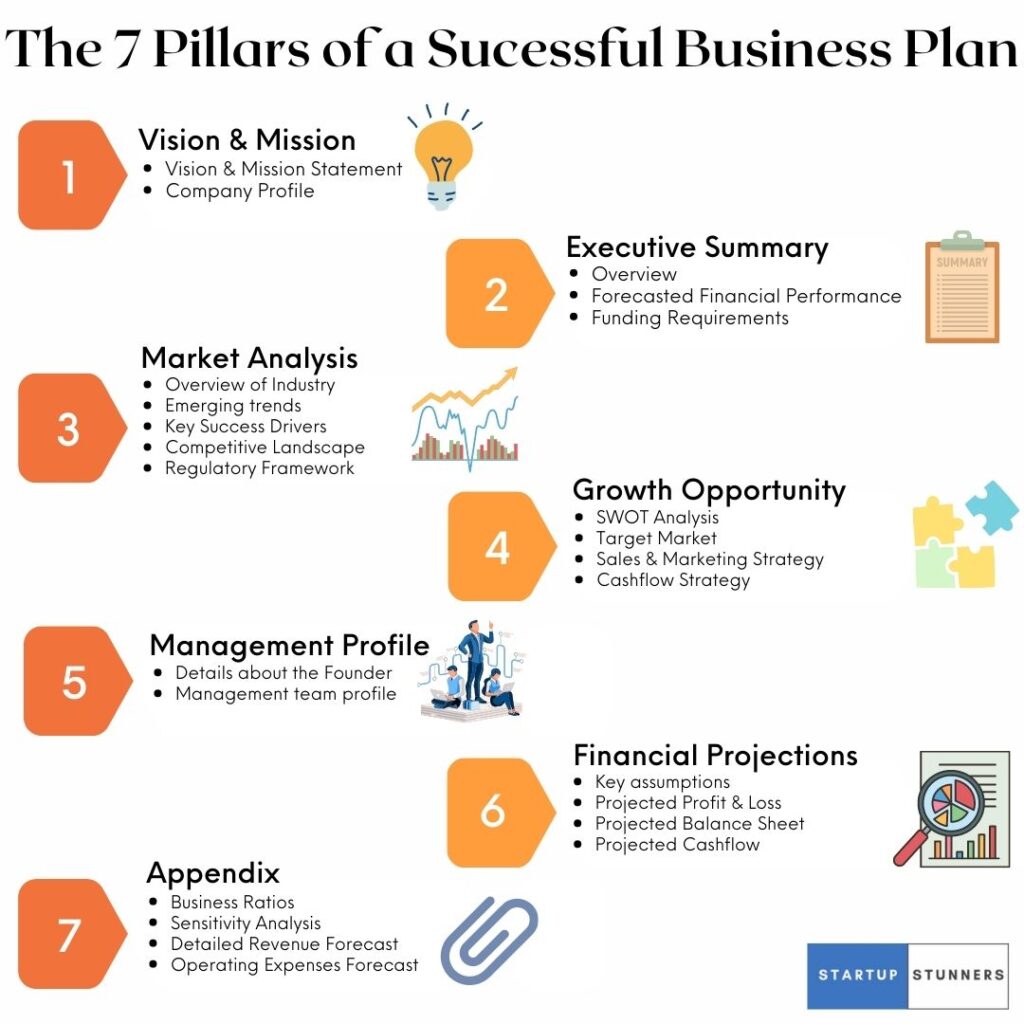Accountants play an important role in the financial landscape, offering critical financial insights to organizations, maintaining correct records, and ensuring regulatory compliance. However, the accounting sector is continually evolving, and accountants today must explore novel business concepts in order to stand out in a crowded market.
In this blog post, we will look at 12 creative business ideas for accountants in the United States. These suggestions go beyond standard accounting services and provide interesting potential to expand your clients, generate revenue, and capitalize on developing business trends. Whether you’re an established accountant trying to diversify your services or an aspiring entrepreneur thinking about a career in accounting, these ideas will encourage you to think outside the box and use your accounting talents in novel ways.
Business Ideas for Accountants
Idea 1: Provide Virtual CFO Services
Many firms in today’s digital age prefer remote and flexible solutions to meet their financial needs. Virtual CFO services have evolved as a novel business model enabling accountants to give high-level financial advice to businesses without requiring a physical presence.
Accountants can provide a variety of services as a virtual CFO, including financial planning, budgeting, cash flow management, financial analysis, and strategic decision-making. Accountants can deliver these services remotely by leveraging technology and communication technologies, saving organizations the costs associated with hiring a full-time CFO.
Virtual CFO services are especially advantageous for small and medium-sized businesses (SMEs) that may lack the resources to retain a full-time CFO. These organizations may receive skilled financial assistance at a fraction of the cost by outsourcing their financial management to a virtual CFO.
As an accountant providing virtual CFO services, you can build long-term connections with your clients, establishing yourself as a trusted advisor and assisting them in navigating complicated financial challenges. Because you can serve businesses across the United States from the comfort of your own office, this business concept allows you to expand your client base beyond geographical boundaries.
Idea 2: Financial Coaching
Financial coaching has grown in popularity in recent years as people seek assistance and support in efficiently managing their own money. Accountants can use their extensive knowledge of financial concerns to provide personalized financial counseling services.
Financial coaching extends beyond typical accounting services to assist individuals in improving their financial well-being. As a financial coach, you will be able to work closely with clients to assess their financial goals, design tailored budgets, devise debt payback methods, and advise them on savings and investment opportunities.
One of the most significant advantages of financial coaching is its tailored approach. You may provide individualized counsel and specific strategies to help each client achieve financial success by understanding their particular financial condition, aspirations, and difficulties. This one-on-one engagement enables you to build trust and long-term relationships with your clientele.
Idea 3: Tax Planning and Consultation
Tax planning is an important component of personal and business financial management. Accountants can specialize in offering complete tax planning and advising services to customers in order to help them maximize their tax strategies and reduce their tax bills.
You can keep up with the ever-changing tax laws and regulations in the United States as a tax planning and counseling professional. You can help individuals maximize deductions, credits, and exemptions, ensure compliance with tax requirements, and investigate tax-saving alternatives. You may aid firms with strategic tax planning, tax return preparation, and guidance on tax-efficient business models.
As tax regulations become more complex, there is a growing demand for professional tax advice. Offering specialized tax services allows you to establish yourself as a trusted tax expert, guiding clients through the complexities of the tax landscape while saving them money.
Idea 4: Forensic Accounting
Investigating financial records, discovering fraud, and providing litigation support in legal issues are all part of forensic accounting. Accountants can use their financial experience and investigation skills to help individuals, businesses, and legal professionals with this novel business concept.
You can specialize as a forensic accountant in detecting financial anomalies, evaluating complex financial data, and generating expert reports for court processes. You can collaborate with attorneys, insurance companies, and law enforcement to give crucial information on financial fraud, embezzlement, and other financial crimes.
The necessity for accurate financial reporting and heightened regulatory scrutiny are driving up demand for forensic accounting services. You may help promote financial integrity and safeguard businesses and individuals from financial losses by providing forensic accounting services.
Idea 5: Sustainability Consulting
Sustainability has emerged as a critical priority for companies seeking to decrease their environmental effect and operate responsibly. Accountants with experience in sustainable business practices, carbon footprint analysis, and green accounting might branch out into sustainability consultancy.
As a sustainability consultant, you can assist organizations in assessing their environmental effect, identifying areas for improvement, and developing plans to meet sustainability objectives. You can help with the implementation of sustainable accounting processes, the measurement and reporting of environmental parameters, and the financial impact of sustainability efforts.
Accountants may provide significant insight and help to firms striving for a more sustainable future as knowledge of climate change grows and the importance of sustainability in company operations grows.
Idea 6: Cloud Accounting Services
As technology has evolved, cloud accounting has increased in favor among organizations. Accountants who specialize in cloud-based accounting services can assist clients optimize their financial procedures by leveraging online accounting software.
Cloud accounting allows businesses to access their financial data from any location and easily communicate with accountants. As a cloud accounting service provider, you can offer online bookkeeping, financial reporting, accounts receivable/payable management, and automated invoicing.
Migrating to cloud-based accounting systems can help businesses increase productivity, reduce costs, and improve data security. You can also provide clients with real-time financial analytics, enabling them to make swift business decisions.
Accounting firms that provide cloud accounting services position themselves as tech-savvy professionals that are adapting to the accounting industry’s digital transformation. By embracing this business model, you can address the growing demand for remote and flexible accounting solutions while staying technologically ahead of the curve.
Idea 7: Personal Financial Management
Many people struggle with efficiently managing their own finances. Accountants can assist individuals achieve their financial goals, increase their financial literacy, and gain control over their money by providing personal financial management services.
Personal financial managers can aid with budgeting, debt management, investment advice, retirement planning, and wealth preservation techniques. You may empower individuals to make informed financial decisions and safeguard their financial future by examining their financial situations, understanding their aspirations, and providing individualized counsel.
Idea 8: Business Valuation Services
Business valuation is important in a variety of situations, including mergers, acquisitions, business sales, and legal actions. Accountants can specialize in business valuation and provide clients with competent valuation services.
As a business valuation expert, you may determine the worth of a company based on financial research, market conditions, industry trends, and other pertinent aspects. Your experience in business valuation can aid buyers and sellers in making educated judgments, legal actions, and strategic planning for businesses.
Idea 9: Outsourced Bookkeeping
Bookkeeping is a critical component of business financial management, but many firms struggle to meet the expectations of accurate and timely bookkeeping. Accountants can provide organizations with outsourced bookkeeping services, addressing their day-to-day financial recording and reporting needs.
You may help businesses maintain structured financial records, manage income and expenses, reconcile accounts, and generate financial statements by providing outsourced bookkeeping. This solution alleviates the strain of bookkeeping, allowing firms to focus on core activities while guaranteeing compliance and financial clarity.
Idea 10: Niche Industry Accounting
Accountants can specialize in serving specific specialized industries and give businesses in those areas with tailored accounting services. You can position yourself as a qualified and trustworthy counsel by establishing experience in the accounting procedures and regulations related to a specific industry.
Healthcare, real estate, hospitality, technology, and entertainment are examples of niche industry accounting. Understanding the distinct issues, tax considerations, and financial requirements of these industries enables you to provide specialist accounting services, industry-specific financial advice, and compliance help.
Idea 11: E-commerce Accounting
With the development of e-commerce, internet businesses have faced new accounting issues. Accountants who specialize in e-commerce accounting can provide customised solutions to the financial complexities that e-commerce firms encounter.
You can help firms with sales tax compliance, inventory management, payment processing reconciliation, financial analysis of online sales channels, and integration with e-commerce platforms as an e-commerce accountant. Your e-commerce accounting experience guarantees that online businesses keep correct financial records and meet their tax requirements in the rapidly expanding digital sector.
Idea 12: Financial Technology (FinTech) Solutions
Accounting and technology colliding creates chances for accountants to develop and sell financial technology (FinTech) solutions. You can design creative software, apps, or platforms that automate financial operations, boost productivity, and improve financial decision-making by leveraging your accounting skills and collaborating with technology specialists.
Automated spending tracking, financial analytics tools, invoice management systems, and customized accounting software are examples of financial technology solutions. You can not only streamline your own accounting practice but also provide value-added services to businesses looking for innovative financial management tools by implementing FinTech solutions.
These unusual accounting business ideas offer a variety of opportunities for professional development and innovation. Accounting professionals may use their expertise, adapt to changing market needs, and position themselves as trustworthy consultants in their chosen specialty by embracing these business ideas.
How we can help:
When thinking about beginning your own business, it’s critical to have a sound business plan to help you through the process. We specialize in generating personalized business plans that are suited to your specific needs and goals.

Our professional team of writers and consultants will collaborate with you to create a complete business plan that includes everything from market research and financial predictions to marketing strategies and operational plans.
You may be confident in your abilities to begin and grow a profitable business with our business plan writing services. Don’t let the prospect of developing a business plan deter you from pursuing your entrepreneurial aspirations; instead, let Startup Stunners assist you in getting started now.
Summary
| Business Idea | Profitability | Skill Requirement | Startup Costs | Time Commitment | Target Audience | Personal Interest | Risks and Challenges |
| Idea 1: Virtual CFO Services | High | Advanced accounting, financial planning, strategic thinking | $5,000 – $10,000 | Moderate | Small and medium-sized businesses | Financial strategy and analysis | Building client trust, competition from established firms |
| Idea 2: Financial Coaching | Moderate | Strong financial knowledge, communication, coaching skills | $1,000 – $5,000 | Flexible | Individuals seeking financial guidance | Personal finance and helping others | Building client base, managing client expectations |
| Idea 3: Tax Planning and Advisory | High | Advanced tax knowledge, research, attention to detail | $2,000 – $10,000 | Seasonal | Individuals and businesses | Tax regulations and strategies | Keeping up with changing tax laws, potential audits |
| Idea 4: Forensic Accounting | Moderate | Financial analysis, investigation, legal knowledge | $5,000 – $20,000 | Flexible | Legal firms, insurance companies | Detecting financial fraud | High responsibility, complex legal proceedings |
| Idea 5: Sustainability Consulting | Moderate | Sustainability knowledge, financial analysis, consulting skills | $2,000 – $10,000 | Flexible | Businesses aiming for sustainability | Environmental responsibility | Keeping up with evolving sustainability practices |
| Idea 6: Cloud Accounting Services | High | Cloud accounting software expertise, customer service skills | $1,000 – $5,000 | Flexible | Small and medium-sized businesses | Technology integration | Data security, adapting to changing technology |
| Idea 7: Personal Financial Management | Moderate | Personal finance knowledge, budgeting, communication skills | $500 – $2,000 | Flexible | Individuals seeking financial guidance | Financial empowerment | Client retention, personalized approach |
| Idea 8: Business Valuation Services | High | Business valuation expertise, financial analysis, research | $5,000 – $20,000 | Project-based | Businesses in need of valuation | Analyzing market and financial data | Accuracy in valuation, competitive pricing |
| Idea 9: Outsourced Bookkeeping | Moderate | Bookkeeping expertise, attention to detail, organizational skills | $500 – $5,000 | Flexible | Small businesses, entrepreneurs | Financial organization | Client acquisition, managing multiple clients |
| Idea 10: Niche Industry Accounting | Moderate | Industry-specific accounting knowledge, research skills | $2,000 – $10,000 | Flexible | Businesses within specific industries | Industry-specific regulations | Limited market size, continuous industry learning |
| Idea 11: E-commerce Accounting | High | E-commerce accounting knowledge, tech-savviness | $1,000 – $5,000 | Moderate | Online businesses | Digital marketplace | Complex tax regulations, integrating with e-commerce platforms |
| Idea 12: Financial Technology (FinTech) Solutions | High | Accounting and technology expertise, software development | $10,000 – $50,000 | Moderate to high | Businesses seeking innovative solutions | Technological innovation | Rapid technological advancements, competition |
Conclusion
In conclusion, the field of accounting offers numerous unique business ideas for accountants to explore and pursue. Each concept has its own set of benefits, problems, and possibilities. Accountants can make informed decisions about the company concepts they want to pursue by examining aspects such as profitability, skill needs, beginning expenses, time commitment, target audience, personal interest, and risks/challenges.
Accountants can position themselves as useful and trusted professionals in the accounting sector by carefully considering these characteristics and selecting business ideas that correspond with their talents, interests, and market demands.
Frequently Asked Questions
Q: How can I get more clients for my accounting firm?
A: There are a number of efficient methods for gaining clients to your accounting firm. Building contacts and networking with people in comparable areas, such as lawyers or business consultants, can lead to recommendations. Having a strong online presence via a professional website and social media platforms can help you demonstrate your competence. Providing useful information, such as blog articles or videos, can also illustrate your expertise and attract new clients. Attending industry events and joining professional organizations can also help with networking.
Q: What credentials or certificates should I have for these business ventures?
A: The certificates or qualifications required depend on the exact business idea and the services you intend to provide. Becoming a Certified Public Accountant (CPA), for example, is frequently advantageous for many accounting-related enterprises. Certain business ideas may benefit from specialized credentials, such as Certified Financial Planner (CFP) for financial planning or Certified Fraud Examiner (CFE) for forensic accounting. It’s critical to examine the precise certificates or qualifications required for your selected business idea, as well as to verify compliance with any legal or professional standards.
Q: How can I set myself out from my accounting industry competitors?
A: Focus on offering great customer service and customized solutions to separate yourself from competition. Building excellent customer relationships and providing value beyond typical accounting services might help you stand out. Specializing in a particular area or providing one-of-a-kind services can also help your company stand out. Thought leadership, such as speaking engagements or article publication, can help you establish credibility. Embracing technology and being current on industry changes can also help you gain a competitive advantage.
Q: How can I set the cost of my accounting services?
A: Pricing your accounting services takes careful consideration of criteria such as your level of experience, the complexity of the services, market demand, and the willingness to pay of your target audience. Insights can be gained by researching industry standards and examining rivals’ pricing. Consider the value you provide to clients as well as the time and resources needed to deliver the services. Offering several pricing tiers or packages to cater to varied client needs and budgets may be beneficial.






